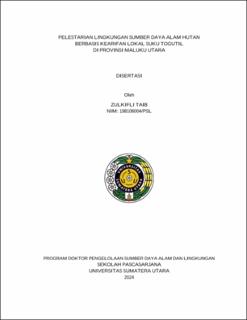Pelestarian Lingkungan Sumber Daya Alam Hutan Berbasis Kearifan Lokal Suku Togutil di Provinsi Maluku Utara
Environmental Conservation of Natural Forest Resources Based on The Local Wisdom of The Togutil Tribe in North Maluku Province

Date
2024Author
Taib, Zulkifli
Advisor(s)
Sibarani, Robert
Fikarwin
Delvian
Metadata
Show full item recordAbstract
The traditional way of life of Indonesian society reflects a community that preserves and conserves its environment. This stems from noble values that have evolved into local wisdom aimed at protecting, utilizing, and safeguarding the environment. One example of such local wisdom in Indonesia is found among the Togutil tribe in North Maluku Province, who live in the tradition of hunting and gathering in the forest. This study aims to identify the methods used by the Togutil tribe to preserve the environment, both its biological and non-biological resources, and to formulate the local wisdom of the Togutil tribe for sustainable environmental protection. The Qualitative Description method refers to a research approach that aims to thoroughly and comprehensively understand the native language, time, and environment, not just to seek meaning but specifically for its utility in revealing original cultural themes during interviews with research informants. The Togutil tribe holds the belief that the forest is a place of interaction with their ancestors, a source of both wood and non-wood needs for life, and a necessary resource for health care. The management of biological and non-biological forest resources is divided into three areas: 1) Jurame/Goyowa area, 2) Garden/Dumie area, and 3) Sacred Forest/Hongana Magomana area. Ancestral customs and prohibitions are exemplified through the local wisdom of the Togutil tribe in their efforts to preserve forest natural resources. Some of the frameworks of values that embody this local wisdom include: 1) Restrictions/Prohibitions on damaging food sources, or excessively harvesting sago palm as the staple food of the Togutil tribe in forest areas, 2) Buko, Restrictions on harvesting plants from specific gardens or areas during agreed-upon periods, 3) Nonako (Signifier) marking the boundaries of their customary territories. The novelty of this research lies in the practice of the Togutil tribe in replanting in deforested areas, with the aim of restoring biodiversity, maintaining soil fertility, and providing habitat for flora and fauna, using local wisdom where every newborn child and deceased parent is commemorated by planting a tree known as Nonako. Additionally, determining the carrying capacity of the restored forest environment to manage sustainable forests with local wisdom prohibits damaging food sources called Bohono, and conducting reforestation requiring increased biodiversity or ecosystem restoration to strengthen forest ecosystems and create ecologically balanced environments through the installation of sacred forest prohibition signs called Buko. The Togutil tribe's belief in the special relationship between humans, trees, and forests, where they are integrated into one natural forest ecosystem. Human lives can be threatened if the forest is damaged, but forest conservation is also ensured if humans manage it wisely.
